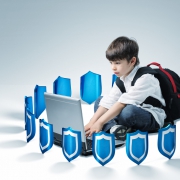Simple Yet Effective Ways to Prevent Online Bullying
There’s no denying that the online world comes with many advantages for young people. It makes it easier for them to research school topics, communicate with their friends, have fun, and learn about other cultures, people, and places.
At the same time however, life online comes with the risk of being victimised by something that’s becoming more and more rampant nowadays: cyber bullying. While this is certainly a cause for concern, the good news is there are simple yet effective techniques you can use to help prevent cyber bullying—and save your loved ones from its nasty effects.
Communication is Key
Around 27% of students in years four to nine encounter some form of cyber bullying. For those students, the experience can feel bewildering, intimidating, and scary. If you’re a parent or guardian, you should discuss what cyber bullying is so that your children are aware of when they’re already being bullied. This way, they’ll be able to distinguish normal teasing from bullying, allowing them to determine when to say “No.”
This also has the effect of enabling children—may it be your own or other parents’—to know when they may already be acting as the bully themselves. This results in them knowing that what they’re doing might be wrong. Having awareness, regardless of age, is a crucial step in dealing and preventing issues such as bullying. With greater awareness of the problem they may feel more comfortable with informing their parents, guardians, or teachers about it.
Educating Children on Online Boundaries
According to recent statistics, 65% of bullying victims will ignore the issue and 35% will do nothing, even when they recognise that there’s a problem. Although it’s difficult to identify why these responses are happening, there is a chance that some children aren’t aware of what boundaries are appropriate online. For example, they may feel upset at a friend sharing unpleasant photos of them with captions that might be deemed as a form of harassment, but they may not know that this can already be considered as a form of cyber bullying. Hence, they might “let it go,” thinking that it’s just a normal part of friendship, propagating the bullying.
Discussing social media boundaries with your child could lead to two positive effects. First, they’ll know how to recognise when their or their friends’ personal boundaries have been breached. This could include being subjected to offensive group chats about one person and sharing unpleasant photos with the intention to emotionally hurt. Second, they will recognise that these behaviours are wrong and possibly refrain from engaging in them themselves.
As a result, they may seek help as needed, confident that what’s being done to them is wrong, or they may be less likely to become bullies themselves (or participate in any form of bullying). As we’ve said, awareness is critical. You can bolster your discussions by using a child internet monitoring tool for parents that can flag abusive online content and act as a way to accurately demonstrate which posts can be considered as cyber bullying.
Liaising with Your Child’s School
In 2013, 75% of all Australian schools reported that they had encountered problems with cyber bullying amongst their student population. This suggests that schools are aware that the problem is there. And as with any problem directly affecting students, your child’s school should be willing to engage with you on the subject.
If you’re concerned that your child may be suffering due to online bullying, discuss the matter with their teachers and concerned school administrators. Or if you become aware that bullying is occurring even though your child is not necessarily affected by it, pass this knowledge on to the school. When both you and your child’s educators are working together to address the problem, you’re more likely to succeed. Plus, they have the added educational resources that can help deal with the issue better.
Creating an Open Dialogue Regarding Online Bullying
Finally, always reassure your children that they can talk to you about cyber bullying. Although most parents make it clear that their children can tell them everything, some may need more reassurance that you won’t downplay or disregard their problems. Additionally, they’ll need assurance that they won’t be judged. Remember that children may be emotionally vulnerable, so it’s recommended that you reassure them that you’re there to help and that they mustn’t feel ashamed or embarrassed.
In addition to informing your children that they can always discuss cyber bullying issues with you, emphasise that they should also let you know if they’ve taken part in such acts. Tell them that, while there’s a reason for you to be upset if that is the case, the bigger goal is to help them become better people, prevent unintentionally hurting others, and gain more friends in the process. Some individuals may feel pressured into cyber bullying as a result of the actions of their peers, and if they feel comfortable approaching an adult for guidance, rectifying the problem becomes easier.
At Starshell Student, we work with parents and teachers to deal with and prevent cyber bullying. Our digital platform functions as an innovative and effective online safety tool in Australia that flags social media content that can be considered as a form of online harassment and helps young children and students become responsible users of social media. To learn more about how Starshell Student works and to join our campaign against cyber bullying, you can contact us here.








